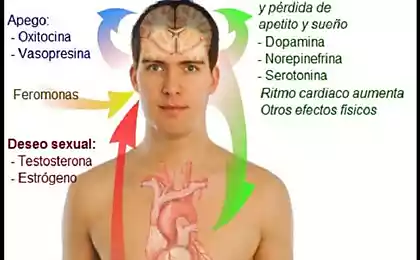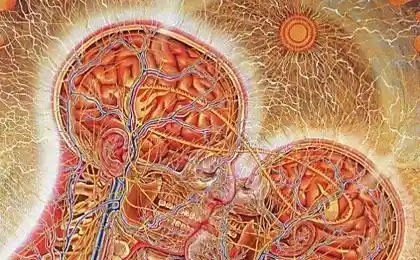837
The hormone oxytocin: the light side of the force
Today's story is about oxytocin. Today we will talk about the positive effect of oxytocin, which stimulates collagen production. About the role of oxytocin in childbirth and feeding, we will not talk and focus on his psychological and social action.
Disruption of oxytocin in modern society have a variety of manifestations: from the disintegration of social groups, communities and families with the increase of aggression and alienation to avoid social contacts (lifestyle of a hikikomori in Japan). The lack of oxytocin encourages people to join a different kind of closed, but cohesive communities, leading often sectarian-radical activity.
Oxytocin plays an important role in various States, for example — during orgasm, social recognition, pair when, in a state of anxiety and maternal behavior. In this regard, this hormone is often called the "love hormone". The inability to produce oxytocin and the inability of a person to empathize with issues such as sociopathy, psychopathy, narcissism.
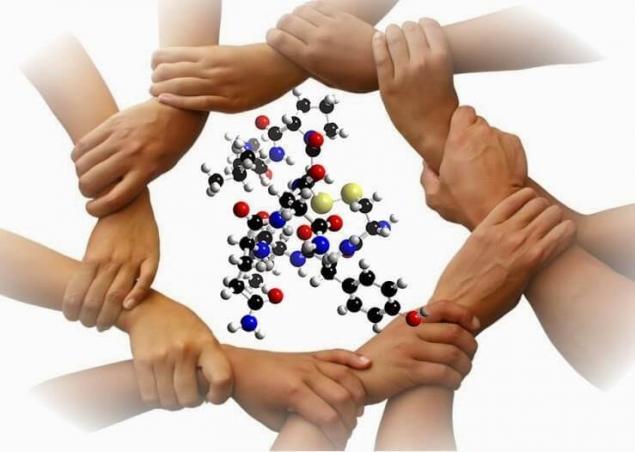
The hormone of love and morality.
The main function of oxytocin is to unite and connect people in community: couple, family, group, nation, etc and maintain a steady connection within this group. Therefore, oxytocin is also called "the molecule of good morals" or "bonding hormone".
The oxytocin in our body breaks down quickly (three minutes cycle half-life), therefore its effect depends on a constant flow of incentives. The ability to put yourself in the other person depends on the level of oxytocin in the blood. This hormone takes an active part in the regulation of social behavior in mammals, including humans.
He is involved in the recognition of familiar individuals in a trusting relationship, regulates the reliability of the marital relations, etc. Oxytocin increases the feeling of "we are family" next to the people close to us. Increasing the level of oxytocin in the blood produces a feeling of satisfaction, reducing fears and anxieties, a sense of trust and serenity beside your partner.

Oxytocin triggers a chain reaction. Oxytocin allows us to feel empathy, and empathy promotes socially acceptable behavior, instill confidence, caring about other people, which in turn allow you to generate they have higher level of oxytocin.
In addition to improving our psychological state of oxytocin improves our health. Maternal and spousal love is associated with reduced risk of a wide range of diseases, from sore throats to ulcers and cardiovascular disease to alcoholism. This is confirmed by research involving animals. In the 1980s, American scientists decided to find out what is the impact of diet on development of atherosclerosis in rabbits, and noticed that two identical groups, there are significant differences in the symptoms.
Groups tended different lab — other conditions were identical. The experiment was repeated twice with different people and published his results in one of the most reputable scientific journals Science. In rabbits who were treated "in kind" are regularly played with them, talked, stroked them, there was a 60 per cent weakening of the symptoms of atherosclerosis, regardless of diet.
Incentives the allocation of oxytocin.
Your low oxytocin.
1. Physical contact.
Sex, hugs, pats – anything. Increase oxytocin and massage, and the level of this hormone increases also the person performing this massage. The important role played by the frequency of strokes: the optimum is considered to be 40 movements per minute. According to studies, this is precisely the frequency of the strokes is selected by instinct, she is more pleasant person. Cuddle four times a day we need for survival, eight to maintain itself in normal form, and twelve for growth." A 20-second hug (or 10-minute hand-holding) reduces the harmful physical effects of stress, including lower blood pressure and heart rate.
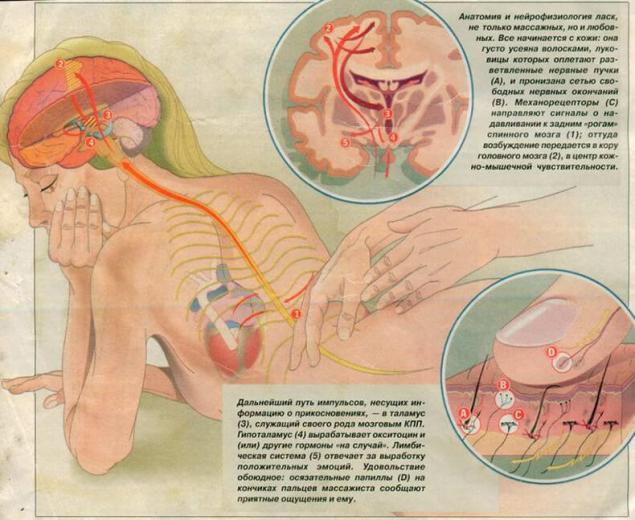
2. Eye contact.
Meeting my eyes, we actually establish contact "brain to brain": both parties know exactly what the interaction between their nervous systems at the moment two way. This reciprocity is the essence of any communication. It is well known that elevated levels of oxytocin in the blood reinforces our tendency to look people in the eye, which in turn improves "mind-reading" and understanding their emotions.
When we look in the eyes, it increases the production of oxytocin. And it works not only in humans but also in dogs. When the dog looks to the owner in the eye, that increases the level of oxytocin, inducing the manifestations of affection and care, which in turn increases the level of oxytocin in dogs, which this will be more certain to watch for the owner.
The same positive feedback involved in the formation of the mutual affection of mother and child. The fact that hand between the wolves and their masters, this is not occurring suggests that the tendency to look in the eyes of the person, thereby causing a release of oxytocin and stimulating the attachment, was developed in dogs in the process of domestication, and is not inherited from wild ancestors. It is possible that this tendency was an adaptation that improved the fitness of the ancestors of modern dogs to live among humans.

3. Verbal contact.
"Talk" is not a smaller release of oxytocin than touch. Especially stimulating the oxytocin compliments.
4. Imaginary contact.
This may be correspondence, and prayer, and meditation.
5. Collective action.
Dancing, a joint snow removal, singing, a joint campaign – it all works perfectly. If possible, find an Amateur choir and join him! You will receive a lot of positive emotions. Even seat at Twitter and Facebook allows you to release oxytocin, though not quite in a healthy way. During the collective actions of people is the release of oxytocin into the blood.
Increases the level of oxytocin in people at various events – the congregation at Church services, at soldiers during a March at the dance. And in all of these situations have seen a very similar picture. During collective actions in humans usually occurs the release of oxytocin into the blood. This provides a close social connection between them.
6. Care about anyone.
Care stimulates the release of oxytocin. Especially need to allocate your Pets – taking care of them stimulates the production of oxytocin. Best dog – she is able to track your eyes, and eye contact – is also a potent oxytocin stimulus.
A simple and effective means is to cultivate the habit of thinking the best of people and to show to people, especially to loved ones, care. Good people live longer and feel better, which clearly confirms many studies in which attention is paid to outside factors like the overall quality of life.
For example, in 1956, researchers at Cornell University began long-term monitoring of 427 young women trying to figure out how marital status, stress, and habits affect their health. By 1993, when the study was completed and published, it became clear that neither the number of children, no education, no social class, no job separately had no significant effect on life expectancy.
A much more important factor turned out to be the participation in voluntary organizations. In 30 years of observations of women not engaged in charitable activities, was seriously ill in 52% of cases, and those who are actively involved in volunteering — just 36 %.
Oxytocin and social development.
We constantly have to deal with strangers. And that oxytocin allows us to maintain with them some civility. Moreover, it helps us to predict the reaction of other people to put yourself mentally in their place. And on the other hand is testosterone that is responsible for the aggressive behavior: "That from these people I will stay away. Something they seem to me suspicious." It turns out that oxytocin and testosterone allow us to find optimal reaction to various types of social interactions.
Only human nature the capacity for such a vast number of social contacts with strangers. For a large number of species possible civilized contact with only the closest relatives. For us, there are no restrictions. Our relationships with other people can be quite different. They can be economic, social, loving, friendly.
In the late nineties, it was shown that it is possible to very clearly link the level of trust with the welfare of the country as a whole. Countries with a low level of confidence, usually have a much lower GDP per capita. We have on this subject a certain number of mathematical models. It is completely different to trying to explain. But in General we can say that trust is a kind of economic lubricant, without trust it is difficult to build an economic relationship, it is difficult to realize large projects and so on.
It turned out that those people who have more vypuskaetsya of oxytocin, the more close friends and a closer relationship with loved ones. They are more happy in marriage. And they are better, more civilized treat strangers. So it turns out that there is a biochemical solution how to make life more civilized and happy.
Oxytocin and the development of children.
In humans there is a direct correlation between a happy childhood and the level of oxytocin in adult life. According to researchers from Emory University in Atlanta, adults from poor families are observed strongly reduced levels of oxytocin in the nervous system compared to those who were lucky to have loving parents. Especially bad with the "hormone of trust" in people with a history of emotional abuse in the family.
Children deprived of contact with their parents immediately after birth, the risk for life to stay flawed in emotional, mental and social respect. Even finding a new full family and loving adoptive parents does not guarantee full rehabilitation, if the child spent the first 1-2 years of life at the shelter. It turned out that 'home' children after talking with the mother the level of oxytocin rises considerably, while cooperative play with a strange woman, this effect does not cause. The former orphans oxytocin did not rise neither from contact with the foster mother, nor from communicating with a stranger.
These sad results show that the ability to enjoy communication with your loved one, apparently, is formed in the first months of life. Kids deprived during this critical period the most important — contact with parents — can for life stay emotionally depleted, they will be difficult to adapt in society and to create a full family.
Inhalation of oxytocin improves the ability of patients with autism to interact with others and decreases they have fear of society. With autism have significantly reduced the natural level of oxytocin in the body, which is characterized by difficulties in communication.
Oxytocin controls not only the relations within the family, but also of relationships in society – if a child is not enough oxytocin, it can not fully communicate with others. He has too many fears, and he becomes autistic. The experiment was carried out – kids with autism were given oxytocin, and they started to look people in the eye. Usually they do not look others in the eye and turn away look to the side. Oxytocin is responsible for trust, sympathy for others.
Those women who in the childhood were brought up in normal conditions, photographs of crying or laughing children caused increased activity of the pleasure centers. According to one of the researchers Strathern lane (Lane Strathearn), the activity of these brain areas does not mean that the mother felt joy or pleasure, and testified to the emergence of motives to action. At the same time, mothers who were brought up without proper attention from the parents, when watching children photos activity observed parts of the brain associated with sensations of pain, burning and irritation.
Family.
According to a 2007 study published in the journal Psychological Science, pregnant women with elevated levels of oxytocin, unlike other women in the first trimester after birth, were more strongly bonded with their babies. They sang to the child, talked to him, fed and bathed in a special way, which contributed to the emergence of the special relations between mother and child.
Oxytocin provides selective attachment of the mother to their own children. The formation of personal attachments (to children or to her husband), apparently, is just one of the aspects (manifestations, realizations) of the more General functions of oxytocin regulation of relations with neighbors. For example, mice with a disabled oxytocin gene ceases to recognize relatives, with whom you previously met. Memory and all the senses they do work fine.
The close relationship of oxytocin regulation of social behavior with forms of cooperation and altruism confirmed by numerous experiments. In particular, it is established that oxytocin is released during positive emotional contacts between family members (e.g., between mother and child), affects the credulity, a tendency towards good deeds, sympathy, helps to understand the mood of others by facial expression, induces often look the interlocutor in the eye, etc.
In Israel recently conducted a major study of women who have recently given birth. And as it turned out? Women with high levels of oxytocin had a great relationship with a newborn, complete harmony and understanding. In women with a lack of oxytocin had problems with feeding babies, and mutual understanding; they have all been more nervous and tense. What happens in this situation with their fathers?
If a woman releases oxytocin, both the men watching her empathic infected with this and also begins to develop. If between a man and a woman establishes a close empathic relationship, they together produce oxytocin and be a wonderful caring parents. Scientists have discovered that high levels of oxytocin makes females, fearless – they are not afraid of anything, they are willing to do anything to protect their young. But if oxytocin is not enough, fears much more. Fear of dogs, for example, usually indicates a lack of oxytocin.

Loyalty and affection.
Oxytocin makes men more sensitive to cues and stimuli carrying information important for establishing good relationships (e.g., friendships or sexual) with other people. Most likely, for women it is affected in the same way — after all, other mammals, oxytocin regulates the attachment of females to their children, and in monogamous species — and even to a sex partner.
German psychologists recently identified another effect of this very simple structure of the peptide. They found that if you drip it in the nose of men, consisting in a permanent monogamous relationship with a woman, then a comfortable distance from unfamiliar attractive women for them is greatly increased, which is not true about men not having a permanent partner.
Thus, the increased endogenous production of oxytocin, married men can serve as a pledge of their fidelity. The results of the first experiment showed that the optimal distance between the man in constant contact with the woman, and the object (the attractive woman) is significantly increased after instillation of oxytocin, and this happens in all situations (i.e. regardless of whether the moving subject or object, whether approaching or they are deleted, looking into each other's eyes or face. I.e. the higher the level of oxytocin in married, the further he is kept from women.
Endorphins and dopamine.
Oxytocin stimulates the production of endorphins and dopamine. So, after a conversation becomes easier, not only mentally but also physically. Loneliness leads to a decrease in the number of oxytocin. But scientists have long noticed the fact, women suffering from pain syndrome — fibromyalgia: severe pain in different joint groups, which is poorly removed painkillers, during orgasm and some time afterwards you don't feel pain.
In the study a group of Australian scientists conducted on rats, it was found that the injection of this hormone in large doses make animals immune to alcohol. This can, according to experts, to help treat alcohol addiction of a person. This happens due to the fact that oxytocin increases the production of dopamine.
Empathy.
With the average level of stress the level of oxytocin increases, but at high, on the contrary, decreases. Why? Because a high level of stress drives the person into a survival mode. In this mode, we have dramatically narrows the planning horizon, and most importantly – is to maximize their own benefits, in the next twenty minutes we don't care about all the rest. It turned out that the level of compassion, inclination to empathy is in direct correlation with the amount of oxytocin, which is thrown into the blood. Further, we have shown that the more in the blood of oxytocin, the higher the willingness to trust and help strangers.
Orgasm and fertility.
Studies have found an increase in lymph oxytocin when you orgasm, how do men and women. The level of oxytocin in the lymph is markedly increased when the orgasm during autostimulation and becomes higher than a normal five minutes after excitation.
In a study published in the journal Physiological Review, it was reported that in rats, after administration of oxytocin in their cerebrospinal fluid, began to experience spontaneous erections. In men during ejaculation is produced by a cocktail of chemicals, including oxytocin. These substances can strengthen the bond between sexual partners. In addition, the hormone produced by the lovers during the embraces and touches.
Substances, reinforcing the connection between people, may also affect the ability to conceive. In animal experiments an increase of oxytocin increased the fertility of individuals. In humans, high levels of oxytocin associated with reduced stress levels and trust location to person — which together can increase the chance of conception.
Appeal.
Oxytocin makes primates more attractive to its customers. the behavior of themselves individuals who received oxytocin did not change, but at the same time they become more attractive to their partners. Partners often come to "oxytocin" individuals longer cared for their hair, than in the control groups.

Stress, anxiety and worry
Oxytocin, under certain circumstances, indirectly inhibits the secretion of adrenocorticotropic hormone and cortisol (stress hormones and activity), and in some situations it may be considered an antagonist of vasopressin. Apparently, oxytocin is responsible for a relaxed, calm state occurring in men after sex. Oxytocin secreted by the brain in a relaxed state and induces sleep. It opposes the effects of cortisol, a stress hormone, calms, reduces anxiety and evokes a feeling of peace.
Oxytocin causes feelings of satisfaction, tranquility and security, and reduces anxiety. Many studies have confirmed the link between the production of oxytocin and human relationships and that the level of hormone increases in the trust relationship and decreases feelings of fear.
In one study confirmed a positive correlation between the number of oxytocin in plasma and the level of anxiety in the lovers of adults. In this regard, the oxytocin may play an important role in the suppression of those parts of the brain that are responsible for the control of behavior, the feeling of fear and anxiety and thus may contribute to the onset of orgasm.
In the experimental group, subjects who entered nasal oxytocin, show "a high level of trust" twice as often than a control group who did not receive oxytocin. Nasal oxytocin demonstrated to reduce fear, possibly due to suppression of the amygdala (which is responsible for the fear of communicating).
oxytocin and related peptides regulate the sexual behavior of females, lay eggs or childbirth, lactation, children and sexual partners. Oxytocin also suppresses the activity of the amygdala (amygdala) of the brain involved in the processing of socially significant information and regulating anxiety and fear (likely the reason why the males after mating become calmer and braver).
Clinical studies have shown the relationship of oxytocin with increased confidence in life and decrease the fear of life. As a result, researchers the conclusion that oxytocin directly affects areas of the brain that are responsible for the behavior of the person, his fears and anxiety.
Trust.
Oxytocin causes a feeling of satisfaction, reduce anxiety and the feeling of tranquility beside your partner. Many studies proved the relationship of oxytocin in human relationships, increasing trust and reducing fear. This suggests that oxytocin can affect areas of the brain responsible for behavior, fear and anxiety. Oxytocin lowers the level of anxiety and stress in the person when dealing with other people. Oxytocin stimulates the production of endorphins, causing a feeling of "happiness". The cat who purrs in response to your stroking is a typical example of the effects of oxytocin.
Generosity.
Geneticists have discovered that some variation in the nucleotide sequence of the gene OXTR encoding oxytocin receptor, and directly connected with the tendency of people to do good deeds to the detriment of personal gain. In particular, it was shown that in humans oxytocin increases trust and generosity.
In other experiments it was discovered another surprising effect of administration of oxytocin increase trust. Men who were administered oxytocin were more generous in the "game of confidence". They give more money to their partner if the partner is a living person, but the generosity is not enhanced by oxytocin, if the partner is a computer.
Perception and oxytocin.
Under the influence of oxytocin men become more sensitive to positive emotional words related to relationships between people, however, oxytocin does not affect the perception of words belonging to different semantic categories.
Oxytocin also helps us hear the voice of a loved person among strong noise. Recent studies have shown that people are able to distinguish a familiar voice. In addition, after this each of us can work with the voice, hear only him, not paying any attention to a stranger, but, like, a lot of noise.
Activation of the vagus nerve.
Oxytocin stimulates the vagus (vagus nerve) and the entire parasympathetic system, and Vice versa. Stimulation of the vagus nerve leads to release of oxytocin and leads to a cascade of other beneficial changes in health status". It is believed that oxytocin modulates inflammation by reducing levels of certain cytokines. Therefore, increased release of oxytocin that accompanies positive social interaction, may contribute to rapid healing.
Scientists have discovered that increasing the level of oxytocin in blood plasma that accompanies social interaction, is associated with accelerated wound healing. They suggested that this happens due to the ability of oxytocin to reduce inflammation, which allows wounds to heal faster.
Also due to the activation of the vagus, oxytocin promotes weight loss and satiety, reduces hunger. In 2011, a study involving the treatment with injections of oxytocin, caused the mice to eat less and lose excess fat.
Oxytocin addiction?
Everything indicates that kindness in the form of oxytocin causes the exact same "addiction". Neuroscientist Thomas Insel in the article "Is social attachment disorder?" says social signals, on the one hand, and the parts of the brain responsible for the production of habits and addictions, on the other, connected by oxytocin, which acts as a transmitter of information. To oxytocin — and hence to friendship, love and kindness — we used exactly the same way as any drug. As in the case of other drugs, kindness causes euphoria, which leads to even more thirst for the goodness.
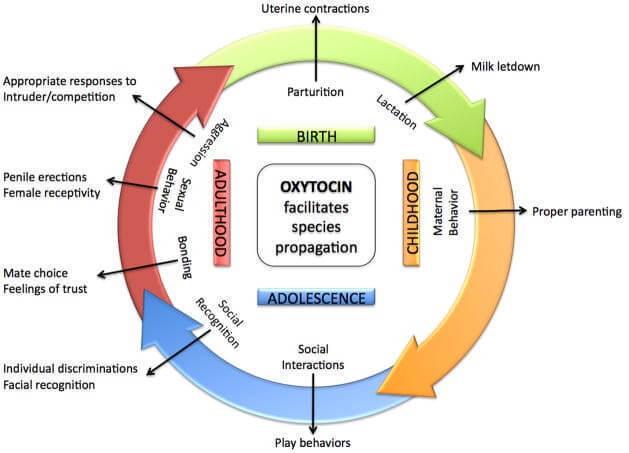
A unique feature of kindness compared to, for example, with heroin, is that it blurs the boundary between consumer and producer. The good actions of others cause pleasure those to whom they are committed, so their desire to do good deeds increases.
Subliminal program: How do people create diseaseexercises for the correction of facial asymmetry
On the other hand, studies show that if you have done something good, you also Torquay — here you have "dobrostan". This will likely pull to do more good. Man, actually, just enough to say that it is good that he began to show more kindness. published
Author: Andrey Blueskin
Source: www.beloveshkin.com/2017/01/oksitocin-svetlaya-storona.html
Disruption of oxytocin in modern society have a variety of manifestations: from the disintegration of social groups, communities and families with the increase of aggression and alienation to avoid social contacts (lifestyle of a hikikomori in Japan). The lack of oxytocin encourages people to join a different kind of closed, but cohesive communities, leading often sectarian-radical activity.
Oxytocin plays an important role in various States, for example — during orgasm, social recognition, pair when, in a state of anxiety and maternal behavior. In this regard, this hormone is often called the "love hormone". The inability to produce oxytocin and the inability of a person to empathize with issues such as sociopathy, psychopathy, narcissism.

The hormone of love and morality.
The main function of oxytocin is to unite and connect people in community: couple, family, group, nation, etc and maintain a steady connection within this group. Therefore, oxytocin is also called "the molecule of good morals" or "bonding hormone".
The oxytocin in our body breaks down quickly (three minutes cycle half-life), therefore its effect depends on a constant flow of incentives. The ability to put yourself in the other person depends on the level of oxytocin in the blood. This hormone takes an active part in the regulation of social behavior in mammals, including humans.
He is involved in the recognition of familiar individuals in a trusting relationship, regulates the reliability of the marital relations, etc. Oxytocin increases the feeling of "we are family" next to the people close to us. Increasing the level of oxytocin in the blood produces a feeling of satisfaction, reducing fears and anxieties, a sense of trust and serenity beside your partner.

Oxytocin triggers a chain reaction. Oxytocin allows us to feel empathy, and empathy promotes socially acceptable behavior, instill confidence, caring about other people, which in turn allow you to generate they have higher level of oxytocin.
In addition to improving our psychological state of oxytocin improves our health. Maternal and spousal love is associated with reduced risk of a wide range of diseases, from sore throats to ulcers and cardiovascular disease to alcoholism. This is confirmed by research involving animals. In the 1980s, American scientists decided to find out what is the impact of diet on development of atherosclerosis in rabbits, and noticed that two identical groups, there are significant differences in the symptoms.
Groups tended different lab — other conditions were identical. The experiment was repeated twice with different people and published his results in one of the most reputable scientific journals Science. In rabbits who were treated "in kind" are regularly played with them, talked, stroked them, there was a 60 per cent weakening of the symptoms of atherosclerosis, regardless of diet.
Incentives the allocation of oxytocin.
Your low oxytocin.
1. Physical contact.
Sex, hugs, pats – anything. Increase oxytocin and massage, and the level of this hormone increases also the person performing this massage. The important role played by the frequency of strokes: the optimum is considered to be 40 movements per minute. According to studies, this is precisely the frequency of the strokes is selected by instinct, she is more pleasant person. Cuddle four times a day we need for survival, eight to maintain itself in normal form, and twelve for growth." A 20-second hug (or 10-minute hand-holding) reduces the harmful physical effects of stress, including lower blood pressure and heart rate.

2. Eye contact.
Meeting my eyes, we actually establish contact "brain to brain": both parties know exactly what the interaction between their nervous systems at the moment two way. This reciprocity is the essence of any communication. It is well known that elevated levels of oxytocin in the blood reinforces our tendency to look people in the eye, which in turn improves "mind-reading" and understanding their emotions.
When we look in the eyes, it increases the production of oxytocin. And it works not only in humans but also in dogs. When the dog looks to the owner in the eye, that increases the level of oxytocin, inducing the manifestations of affection and care, which in turn increases the level of oxytocin in dogs, which this will be more certain to watch for the owner.
The same positive feedback involved in the formation of the mutual affection of mother and child. The fact that hand between the wolves and their masters, this is not occurring suggests that the tendency to look in the eyes of the person, thereby causing a release of oxytocin and stimulating the attachment, was developed in dogs in the process of domestication, and is not inherited from wild ancestors. It is possible that this tendency was an adaptation that improved the fitness of the ancestors of modern dogs to live among humans.

3. Verbal contact.
"Talk" is not a smaller release of oxytocin than touch. Especially stimulating the oxytocin compliments.
4. Imaginary contact.
This may be correspondence, and prayer, and meditation.
5. Collective action.
Dancing, a joint snow removal, singing, a joint campaign – it all works perfectly. If possible, find an Amateur choir and join him! You will receive a lot of positive emotions. Even seat at Twitter and Facebook allows you to release oxytocin, though not quite in a healthy way. During the collective actions of people is the release of oxytocin into the blood.
Increases the level of oxytocin in people at various events – the congregation at Church services, at soldiers during a March at the dance. And in all of these situations have seen a very similar picture. During collective actions in humans usually occurs the release of oxytocin into the blood. This provides a close social connection between them.
6. Care about anyone.
Care stimulates the release of oxytocin. Especially need to allocate your Pets – taking care of them stimulates the production of oxytocin. Best dog – she is able to track your eyes, and eye contact – is also a potent oxytocin stimulus.
A simple and effective means is to cultivate the habit of thinking the best of people and to show to people, especially to loved ones, care. Good people live longer and feel better, which clearly confirms many studies in which attention is paid to outside factors like the overall quality of life.
For example, in 1956, researchers at Cornell University began long-term monitoring of 427 young women trying to figure out how marital status, stress, and habits affect their health. By 1993, when the study was completed and published, it became clear that neither the number of children, no education, no social class, no job separately had no significant effect on life expectancy.
A much more important factor turned out to be the participation in voluntary organizations. In 30 years of observations of women not engaged in charitable activities, was seriously ill in 52% of cases, and those who are actively involved in volunteering — just 36 %.
Oxytocin and social development.
We constantly have to deal with strangers. And that oxytocin allows us to maintain with them some civility. Moreover, it helps us to predict the reaction of other people to put yourself mentally in their place. And on the other hand is testosterone that is responsible for the aggressive behavior: "That from these people I will stay away. Something they seem to me suspicious." It turns out that oxytocin and testosterone allow us to find optimal reaction to various types of social interactions.
Only human nature the capacity for such a vast number of social contacts with strangers. For a large number of species possible civilized contact with only the closest relatives. For us, there are no restrictions. Our relationships with other people can be quite different. They can be economic, social, loving, friendly.
In the late nineties, it was shown that it is possible to very clearly link the level of trust with the welfare of the country as a whole. Countries with a low level of confidence, usually have a much lower GDP per capita. We have on this subject a certain number of mathematical models. It is completely different to trying to explain. But in General we can say that trust is a kind of economic lubricant, without trust it is difficult to build an economic relationship, it is difficult to realize large projects and so on.
It turned out that those people who have more vypuskaetsya of oxytocin, the more close friends and a closer relationship with loved ones. They are more happy in marriage. And they are better, more civilized treat strangers. So it turns out that there is a biochemical solution how to make life more civilized and happy.
Oxytocin and the development of children.
In humans there is a direct correlation between a happy childhood and the level of oxytocin in adult life. According to researchers from Emory University in Atlanta, adults from poor families are observed strongly reduced levels of oxytocin in the nervous system compared to those who were lucky to have loving parents. Especially bad with the "hormone of trust" in people with a history of emotional abuse in the family.
Children deprived of contact with their parents immediately after birth, the risk for life to stay flawed in emotional, mental and social respect. Even finding a new full family and loving adoptive parents does not guarantee full rehabilitation, if the child spent the first 1-2 years of life at the shelter. It turned out that 'home' children after talking with the mother the level of oxytocin rises considerably, while cooperative play with a strange woman, this effect does not cause. The former orphans oxytocin did not rise neither from contact with the foster mother, nor from communicating with a stranger.
These sad results show that the ability to enjoy communication with your loved one, apparently, is formed in the first months of life. Kids deprived during this critical period the most important — contact with parents — can for life stay emotionally depleted, they will be difficult to adapt in society and to create a full family.
Inhalation of oxytocin improves the ability of patients with autism to interact with others and decreases they have fear of society. With autism have significantly reduced the natural level of oxytocin in the body, which is characterized by difficulties in communication.
Oxytocin controls not only the relations within the family, but also of relationships in society – if a child is not enough oxytocin, it can not fully communicate with others. He has too many fears, and he becomes autistic. The experiment was carried out – kids with autism were given oxytocin, and they started to look people in the eye. Usually they do not look others in the eye and turn away look to the side. Oxytocin is responsible for trust, sympathy for others.
Those women who in the childhood were brought up in normal conditions, photographs of crying or laughing children caused increased activity of the pleasure centers. According to one of the researchers Strathern lane (Lane Strathearn), the activity of these brain areas does not mean that the mother felt joy or pleasure, and testified to the emergence of motives to action. At the same time, mothers who were brought up without proper attention from the parents, when watching children photos activity observed parts of the brain associated with sensations of pain, burning and irritation.
Family.
According to a 2007 study published in the journal Psychological Science, pregnant women with elevated levels of oxytocin, unlike other women in the first trimester after birth, were more strongly bonded with their babies. They sang to the child, talked to him, fed and bathed in a special way, which contributed to the emergence of the special relations between mother and child.
Oxytocin provides selective attachment of the mother to their own children. The formation of personal attachments (to children or to her husband), apparently, is just one of the aspects (manifestations, realizations) of the more General functions of oxytocin regulation of relations with neighbors. For example, mice with a disabled oxytocin gene ceases to recognize relatives, with whom you previously met. Memory and all the senses they do work fine.
The close relationship of oxytocin regulation of social behavior with forms of cooperation and altruism confirmed by numerous experiments. In particular, it is established that oxytocin is released during positive emotional contacts between family members (e.g., between mother and child), affects the credulity, a tendency towards good deeds, sympathy, helps to understand the mood of others by facial expression, induces often look the interlocutor in the eye, etc.
In Israel recently conducted a major study of women who have recently given birth. And as it turned out? Women with high levels of oxytocin had a great relationship with a newborn, complete harmony and understanding. In women with a lack of oxytocin had problems with feeding babies, and mutual understanding; they have all been more nervous and tense. What happens in this situation with their fathers?
If a woman releases oxytocin, both the men watching her empathic infected with this and also begins to develop. If between a man and a woman establishes a close empathic relationship, they together produce oxytocin and be a wonderful caring parents. Scientists have discovered that high levels of oxytocin makes females, fearless – they are not afraid of anything, they are willing to do anything to protect their young. But if oxytocin is not enough, fears much more. Fear of dogs, for example, usually indicates a lack of oxytocin.

Loyalty and affection.
Oxytocin makes men more sensitive to cues and stimuli carrying information important for establishing good relationships (e.g., friendships or sexual) with other people. Most likely, for women it is affected in the same way — after all, other mammals, oxytocin regulates the attachment of females to their children, and in monogamous species — and even to a sex partner.
German psychologists recently identified another effect of this very simple structure of the peptide. They found that if you drip it in the nose of men, consisting in a permanent monogamous relationship with a woman, then a comfortable distance from unfamiliar attractive women for them is greatly increased, which is not true about men not having a permanent partner.
Thus, the increased endogenous production of oxytocin, married men can serve as a pledge of their fidelity. The results of the first experiment showed that the optimal distance between the man in constant contact with the woman, and the object (the attractive woman) is significantly increased after instillation of oxytocin, and this happens in all situations (i.e. regardless of whether the moving subject or object, whether approaching or they are deleted, looking into each other's eyes or face. I.e. the higher the level of oxytocin in married, the further he is kept from women.
Endorphins and dopamine.
Oxytocin stimulates the production of endorphins and dopamine. So, after a conversation becomes easier, not only mentally but also physically. Loneliness leads to a decrease in the number of oxytocin. But scientists have long noticed the fact, women suffering from pain syndrome — fibromyalgia: severe pain in different joint groups, which is poorly removed painkillers, during orgasm and some time afterwards you don't feel pain.
In the study a group of Australian scientists conducted on rats, it was found that the injection of this hormone in large doses make animals immune to alcohol. This can, according to experts, to help treat alcohol addiction of a person. This happens due to the fact that oxytocin increases the production of dopamine.
Empathy.
With the average level of stress the level of oxytocin increases, but at high, on the contrary, decreases. Why? Because a high level of stress drives the person into a survival mode. In this mode, we have dramatically narrows the planning horizon, and most importantly – is to maximize their own benefits, in the next twenty minutes we don't care about all the rest. It turned out that the level of compassion, inclination to empathy is in direct correlation with the amount of oxytocin, which is thrown into the blood. Further, we have shown that the more in the blood of oxytocin, the higher the willingness to trust and help strangers.
Orgasm and fertility.
Studies have found an increase in lymph oxytocin when you orgasm, how do men and women. The level of oxytocin in the lymph is markedly increased when the orgasm during autostimulation and becomes higher than a normal five minutes after excitation.
In a study published in the journal Physiological Review, it was reported that in rats, after administration of oxytocin in their cerebrospinal fluid, began to experience spontaneous erections. In men during ejaculation is produced by a cocktail of chemicals, including oxytocin. These substances can strengthen the bond between sexual partners. In addition, the hormone produced by the lovers during the embraces and touches.
Substances, reinforcing the connection between people, may also affect the ability to conceive. In animal experiments an increase of oxytocin increased the fertility of individuals. In humans, high levels of oxytocin associated with reduced stress levels and trust location to person — which together can increase the chance of conception.
Appeal.
Oxytocin makes primates more attractive to its customers. the behavior of themselves individuals who received oxytocin did not change, but at the same time they become more attractive to their partners. Partners often come to "oxytocin" individuals longer cared for their hair, than in the control groups.

Stress, anxiety and worry
Oxytocin, under certain circumstances, indirectly inhibits the secretion of adrenocorticotropic hormone and cortisol (stress hormones and activity), and in some situations it may be considered an antagonist of vasopressin. Apparently, oxytocin is responsible for a relaxed, calm state occurring in men after sex. Oxytocin secreted by the brain in a relaxed state and induces sleep. It opposes the effects of cortisol, a stress hormone, calms, reduces anxiety and evokes a feeling of peace.
Oxytocin causes feelings of satisfaction, tranquility and security, and reduces anxiety. Many studies have confirmed the link between the production of oxytocin and human relationships and that the level of hormone increases in the trust relationship and decreases feelings of fear.
In one study confirmed a positive correlation between the number of oxytocin in plasma and the level of anxiety in the lovers of adults. In this regard, the oxytocin may play an important role in the suppression of those parts of the brain that are responsible for the control of behavior, the feeling of fear and anxiety and thus may contribute to the onset of orgasm.
In the experimental group, subjects who entered nasal oxytocin, show "a high level of trust" twice as often than a control group who did not receive oxytocin. Nasal oxytocin demonstrated to reduce fear, possibly due to suppression of the amygdala (which is responsible for the fear of communicating).
oxytocin and related peptides regulate the sexual behavior of females, lay eggs or childbirth, lactation, children and sexual partners. Oxytocin also suppresses the activity of the amygdala (amygdala) of the brain involved in the processing of socially significant information and regulating anxiety and fear (likely the reason why the males after mating become calmer and braver).
Clinical studies have shown the relationship of oxytocin with increased confidence in life and decrease the fear of life. As a result, researchers the conclusion that oxytocin directly affects areas of the brain that are responsible for the behavior of the person, his fears and anxiety.
Trust.
Oxytocin causes a feeling of satisfaction, reduce anxiety and the feeling of tranquility beside your partner. Many studies proved the relationship of oxytocin in human relationships, increasing trust and reducing fear. This suggests that oxytocin can affect areas of the brain responsible for behavior, fear and anxiety. Oxytocin lowers the level of anxiety and stress in the person when dealing with other people. Oxytocin stimulates the production of endorphins, causing a feeling of "happiness". The cat who purrs in response to your stroking is a typical example of the effects of oxytocin.
Generosity.
Geneticists have discovered that some variation in the nucleotide sequence of the gene OXTR encoding oxytocin receptor, and directly connected with the tendency of people to do good deeds to the detriment of personal gain. In particular, it was shown that in humans oxytocin increases trust and generosity.
In other experiments it was discovered another surprising effect of administration of oxytocin increase trust. Men who were administered oxytocin were more generous in the "game of confidence". They give more money to their partner if the partner is a living person, but the generosity is not enhanced by oxytocin, if the partner is a computer.
Perception and oxytocin.
Under the influence of oxytocin men become more sensitive to positive emotional words related to relationships between people, however, oxytocin does not affect the perception of words belonging to different semantic categories.
Oxytocin also helps us hear the voice of a loved person among strong noise. Recent studies have shown that people are able to distinguish a familiar voice. In addition, after this each of us can work with the voice, hear only him, not paying any attention to a stranger, but, like, a lot of noise.
Activation of the vagus nerve.
Oxytocin stimulates the vagus (vagus nerve) and the entire parasympathetic system, and Vice versa. Stimulation of the vagus nerve leads to release of oxytocin and leads to a cascade of other beneficial changes in health status". It is believed that oxytocin modulates inflammation by reducing levels of certain cytokines. Therefore, increased release of oxytocin that accompanies positive social interaction, may contribute to rapid healing.
Scientists have discovered that increasing the level of oxytocin in blood plasma that accompanies social interaction, is associated with accelerated wound healing. They suggested that this happens due to the ability of oxytocin to reduce inflammation, which allows wounds to heal faster.
Also due to the activation of the vagus, oxytocin promotes weight loss and satiety, reduces hunger. In 2011, a study involving the treatment with injections of oxytocin, caused the mice to eat less and lose excess fat.
Oxytocin addiction?
Everything indicates that kindness in the form of oxytocin causes the exact same "addiction". Neuroscientist Thomas Insel in the article "Is social attachment disorder?" says social signals, on the one hand, and the parts of the brain responsible for the production of habits and addictions, on the other, connected by oxytocin, which acts as a transmitter of information. To oxytocin — and hence to friendship, love and kindness — we used exactly the same way as any drug. As in the case of other drugs, kindness causes euphoria, which leads to even more thirst for the goodness.

A unique feature of kindness compared to, for example, with heroin, is that it blurs the boundary between consumer and producer. The good actions of others cause pleasure those to whom they are committed, so their desire to do good deeds increases.
Subliminal program: How do people create diseaseexercises for the correction of facial asymmetry
On the other hand, studies show that if you have done something good, you also Torquay — here you have "dobrostan". This will likely pull to do more good. Man, actually, just enough to say that it is good that he began to show more kindness. published
Author: Andrey Blueskin
Source: www.beloveshkin.com/2017/01/oksitocin-svetlaya-storona.html
The recipe for success from Richard Branson: Sleep more!
We used to not say what I think and do not what we feel...





